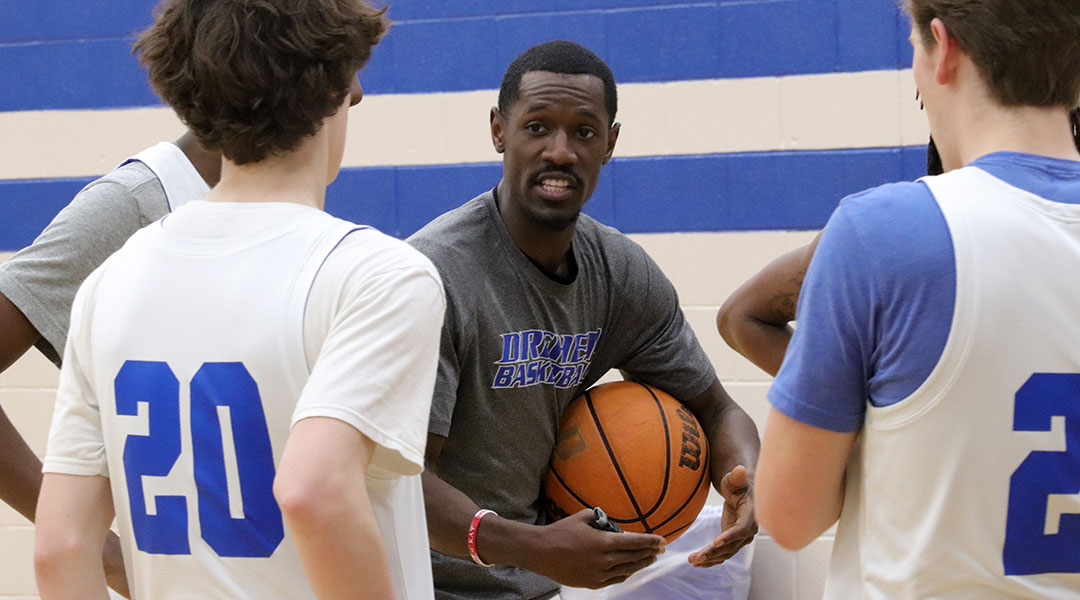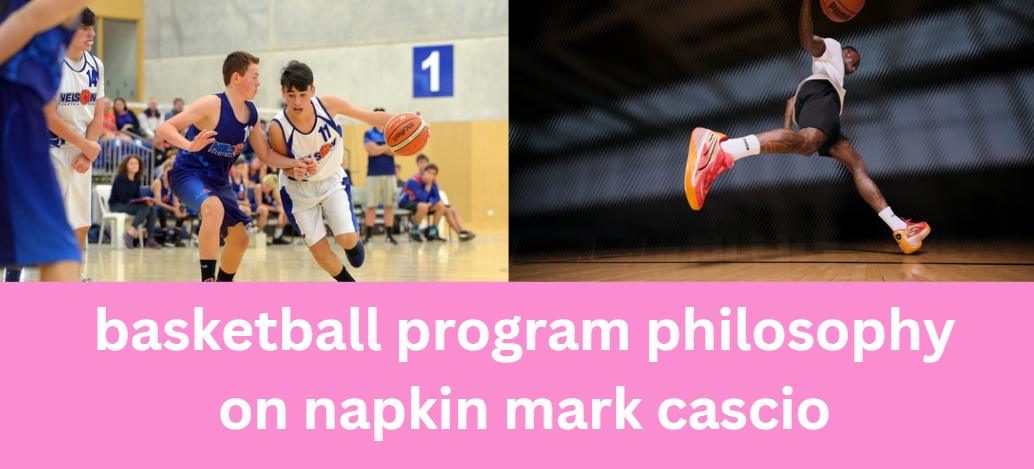Basketball Program Philosophy on Napkin Mark Cascio: A Comprehensive Guide
Mark Cascio’s approach to basketball coaching has become a transformative philosophy that emphasizes character, teamwork, and a strong work ethic. His unique perspective, often captured in a simple format dubbed the “basketball program philosophy on napkin,” has gained traction among coaches and athletes alike. This philosophy is not just a strategy for winning games; it is a holistic approach that nurtures personal development and instills core values in young athletes.
In this detailed article, we will explore the basketball program philosophy on napkin Mark Cascio, analyzing its key components, the rationale behind it, and how it can be effectively implemented in various coaching environments. We will also provide practical tips, insights, and interpretations that go beyond existing literature to help coaches and players embrace this philosophy.
Contents
- 1 1. Introduction to Mark Cascio’s Philosophy
- 2 2. The Core Tenets of the Philosophy
- 3 3. Simplifying the Game: The Napkin Concept
- 4 4. Empowerment and Accountability in Coaching
- 5 5. Implementing the Philosophy in Practice
- 6 6. Success Stories: Programs Transformed
- 7 7. Challenges and Solutions
- 8 8. Conclusion
- 9 FAQs
- 9.1 1. What is the core focus of Mark Cascio’s basketball program philosophy?
- 9.2 2. How can coaches implement this philosophy in their programs?
- 9.3 3. What are some common challenges in adopting this philosophy?
- 9.4 4. Are there any success stories related to this philosophy?
- 9.5 5. How does the napkin concept simplify coaching?
1. Introduction to Mark Cascio’s Philosophy

Mark Cascio’s philosophy centers on creating a comprehensive program that not only focuses on athletic skills but also on the development of life skills. The basketball program philosophy on napkin Mark Cascio serves as a blueprint for coaches to develop their teams holistically. By emphasizing foundational elements such as character, teamwork, and a strong work ethic, Cascio aims to cultivate well-rounded individuals who excel both on and off the court.
2. The Core Tenets of the Philosophy
Cascio’s philosophy can be broken down into several key components, each playing a crucial role in shaping the athlete’s experience and growth.
2.1 Character Development
Character is at the forefront of Cascio’s coaching approach. He believes that a player’s character significantly impacts their performance and interactions on the team. Key aspects of character development include:
- Integrity: Emphasizing honesty and ethical behavior.
- Respect: Cultivating respect for oneself, teammates, opponents, and the game.
- Resilience: Teaching players to bounce back from setbacks and learn from failures.
2.2 Teamwork
Cascio stresses the importance of collaboration and unity within a team. His philosophy advocates for:
- Communication: Open lines of communication among players and coaches.
- Trust: Building a culture of trust where players feel safe to express themselves.
- Collective Goals: Encouraging a team-first mentality over individual accolades.
2.3 Work Ethic
A strong work ethic is vital in Cascio’s coaching philosophy. He promotes:
- Commitment: Instilling a sense of dedication to practice and improvement.
- Discipline: Encouraging players to follow through on their commitments and maintain focus.
- Continuous Learning: Fostering an environment where players are always looking to improve their skills and understanding of the game.
3. Simplifying the Game: The Napkin Concept
The basketball program philosophy on napkin Mark Cascio is often illustrated on a napkin as a simple yet profound concept. By condensing complex ideas into an easily digestible format, Cascio ensures that players and coaches can quickly grasp essential principles without feeling overwhelmed.
This simplicity is key to effective coaching, allowing teams to focus on what truly matters without getting bogged down in technical jargon or overly complicated strategies. The napkin approach serves as a reminder to keep the fundamentals front and center, ensuring that everyone involved stays aligned with the program’s core values.
4. Empowerment and Accountability in Coaching

Cascio’s philosophy also emphasizes the importance of empowering players and holding them accountable for their actions. This dual approach fosters an environment where athletes can thrive and develop into leaders both on and off the court.
- Empowerment: Coaches encourage players to take ownership of their roles and contributions, instilling confidence and self-reliance.
- Accountability: Players are held responsible for their performance and behavior, promoting a culture of integrity and commitment.
5. Implementing the Philosophy in Practice
5.1 Training Sessions
To implement the basketball program philosophy on napkin Mark Cascio effectively, coaches can integrate these principles into their training sessions. This includes:
- Character Education: Incorporating discussions about character development into team meetings and training sessions.
- Team-Building Exercises: Engaging in activities that foster trust and communication among players.
- Skill Development: Balancing technical skills with lessons on work ethic and resilience.
5.2 Game Strategies
In-game situations provide valuable opportunities to reinforce Cascio’s philosophy. Coaches can emphasize:
- Team Play: Encouraging players to prioritize teamwork over individual statistics.
- Positive Reinforcement: Acknowledging players who demonstrate good character and work ethic during games.
- Reflective Practices: After games, coaches can lead discussions about what the team learned in terms of both performance and character.
6. Success Stories: Programs Transformed
Numerous programs have successfully adopted Cascio’s philosophy, witnessing profound transformations in their culture and performance. Some notable examples include:
- High School Teams: Programs that have integrated character development into their coaching strategies have reported improved team cohesion and reduced behavioral issues among players.
- Youth Leagues: Organizations focusing on work ethic and teamwork have seen increased player retention and positive feedback from parents and community members.
These success stories illustrate how the basketball program philosophy on napkin Mark Cascio can lead to significant positive changes, fostering an environment where athletes can thrive.
7. Challenges and Solutions

Implementing Cascio’s philosophy is not without its challenges. Coaches may face resistance from players accustomed to traditional coaching methods or struggle to integrate character development into their routines.
Solutions:
- Education: Provide workshops and resources for coaches to understand the importance of this holistic approach.
- Patience: Emphasize that change takes time and requires consistent reinforcement of the philosophy’s core tenets.
- Flexibility: Adapt the philosophy to fit the unique dynamics of each team, ensuring that it resonates with players.
8. Conclusion
Mark Cascio’s basketball program philosophy on napkin is a powerful framework for coaching that transcends mere technical instruction. By focusing on character development, teamwork, and a strong work ethic, coaches can cultivate not only better athletes but also better individuals. The simplicity of the napkin concept allows for quick understanding and easy implementation, making it accessible for programs at all levels.
As the landscape of youth sports continues to evolve, adopting Cascio’s philosophy can provide a competitive edge while fostering a positive environment where athletes can flourish. Coaches who embrace this philosophy will find themselves equipped to make a lasting impact on their players, both on and off the court.
FAQs
1. What is the core focus of Mark Cascio’s basketball program philosophy?
Mark Cascio’s philosophy centers on character development, teamwork, and work ethic, aiming to develop well-rounded athletes who excel both on and off the court.
2. How can coaches implement this philosophy in their programs?
Coaches can integrate character education, team-building exercises, and positive reinforcement in training sessions and game strategies to effectively implement Cascio’s philosophy.
3. What are some common challenges in adopting this philosophy?
Common challenges include resistance from players used to traditional methods and difficulty integrating character development into routines. Coaches can overcome these challenges through education, patience, and flexibility.
Yes, several high school and youth league programs have adopted Cascio’s philosophy, resulting in improved team cohesion, player retention, and positive community feedback.
5. How does the napkin concept simplify coaching?
The napkin concept condenses complex ideas into simple, digestible formats, allowing players and coaches to quickly grasp essential principles without feeling overwhelmed.
By embracing Mark Cascio’s basketball program philosophy on napkin, coaches and players alike can unlock their full potential, transforming not just their teams but their lives through the power of basketball.

